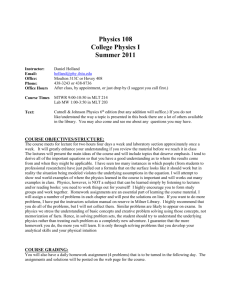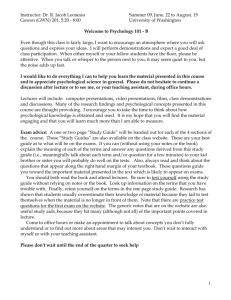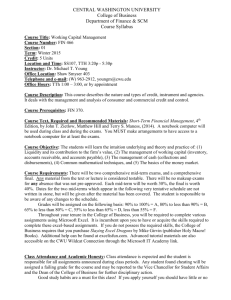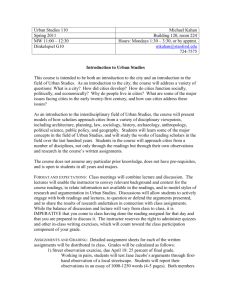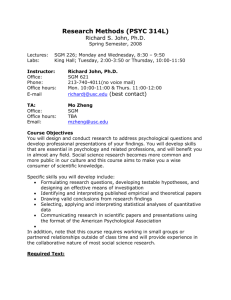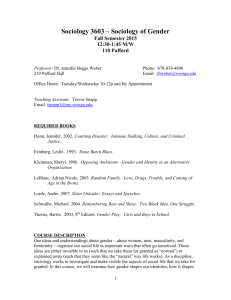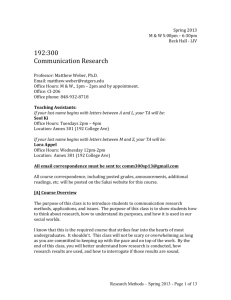Anthropology 2510Y
advertisement
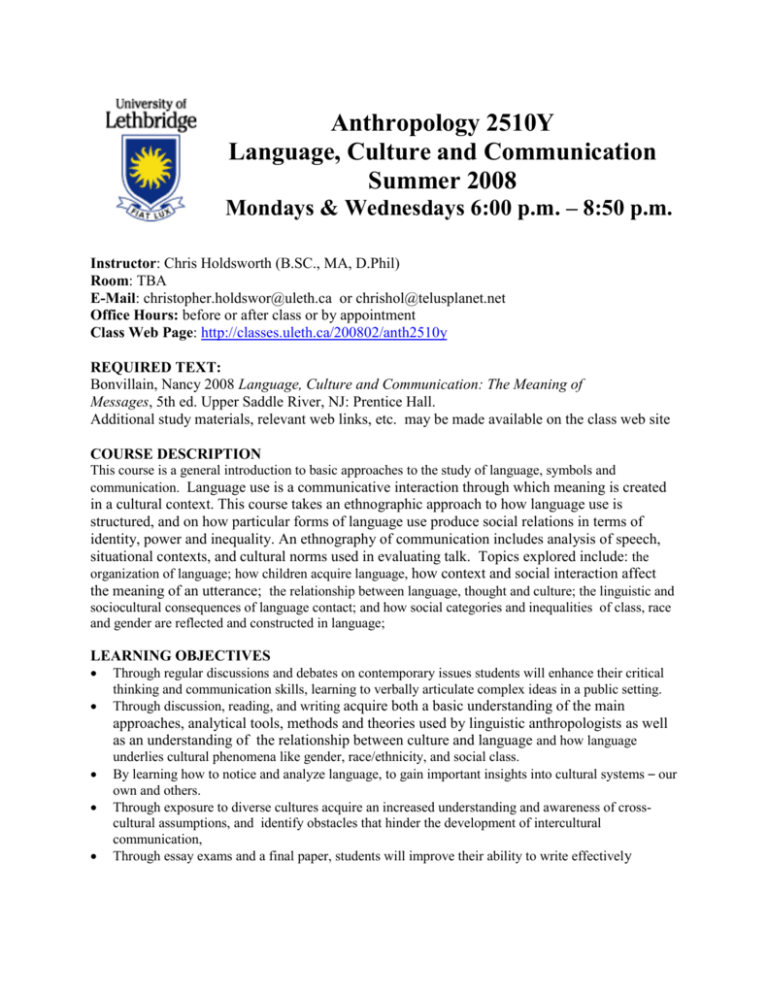
Anthropology 2510Y Language, Culture and Communication Summer 2008 Mondays & Wednesdays 6:00 p.m. – 8:50 p.m. Instructor: Chris Holdsworth (B.SC., MA, D.Phil) Room: TBA E-Mail: christopher.holdswor@uleth.ca or chrishol@telusplanet.net Office Hours: before or after class or by appointment Class Web Page: http://classes.uleth.ca/200802/anth2510y REQUIRED TEXT: Bonvillain, Nancy 2008 Language, Culture and Communication: The Meaning of Messages, 5th ed. Upper Saddle River, NJ: Prentice Hall. Additional study materials, relevant web links, etc. may be made available on the class web site COURSE DESCRIPTION This course is a general introduction to basic approaches to the study of language, symbols and communication. Language use is a communicative interaction through which meaning is created in a cultural context. This course takes an ethnographic approach to how language use is structured, and on how particular forms of language use produce social relations in terms of identity, power and inequality. An ethnography of communication includes analysis of speech, situational contexts, and cultural norms used in evaluating talk. Topics explored include: the organization of language; how children acquire language, how context and social interaction affect the meaning of an utterance; the relationship between language, thought and culture; the linguistic and sociocultural consequences of language contact; and how social categories and inequalities of class, race and gender are reflected and constructed in language; LEARNING OBJECTIVES Through regular discussions and debates on contemporary issues students will enhance their critical thinking and communication skills, learning to verbally articulate complex ideas in a public setting. Through discussion, reading, and writing acquire both a basic understanding of the main approaches, analytical tools, methods and theories used by linguistic anthropologists as well as an understanding of the relationship between culture and language and how language underlies cultural phenomena like gender, race/ethnicity, and social class. By learning how to notice and analyze language, to gain important insights into cultural systems – our own and others. Through exposure to diverse cultures acquire an increased understanding and awareness of crosscultural assumptions, and identify obstacles that hinder the development of intercultural communication, Through essay exams and a final paper, students will improve their ability to write effectivel y COURSE FORMAT: The course will follow an interactive lecture-discussion format and small group and individual activities accompanied by the occasional film. Classes will not necessarily repeat or cover all the material in the text but will elaborate on selected topics and use additional case studies to provide a deeper understanding of the material. Assigned textbook readings may be augmented with suggested additional readings and handouts. Although not a grade component, students are expected to contribute to class discussions so attendance and participation is therefore essential. ATTENDANCE AND PARTICIPATION Although attendance and participation are not considered in the grade for this course students are expected to attend all classes and to contribute to class discussions based on the assigned readings. Students will be unable to make valuable contributions to the discussion, or benefit from the contributions of others, if the readings have not been done beforehand. As students are required to demonstrate a working knowledge of all course materials in exams, grades will suffer if more than two classes are missed. ASSESSMENT Assessment for this course will be based on two midterm exams, a final exam and a term paper. Exams will cover the assigned readings and all material discussed in class and presented in videos. Exams will not be cumulative, although students are expected to have a good grasp of basic concepts for later exams. 1. Mid-term Exam 1 Date: May 21 Weight: 20% of final grade. 2. Mid-term Exam 2 Date: June 4 Weight: 20% of final grade. 3. Final Exam Date June 23 Weight: 30% of final grade. 4. Term paper Date June 18 Weight: 30% of final grade. Additional Information about the exams and term paper will. Be provided the first day of class. DEFERRALS AND MISSED EXAMINATIONS Exams must be taken at the scheduled times and assignments handed in on the dates specified. Course material submitted late will lose 10% of the mark per day that they are late. Students may be granted an extension on submissions or deferral from writing the mid-term exam only due to illness or other extenuating circumstances beyond their control and with the presentation of a valid written explanation from the appropriate authority, e.g. a physician or employer. Alternative arrangements may be made at the discretion of the instructor. Students who miss the final exam must apply to the Dean for deferral. PLAGIARISM Plagiarism: “to steal and pass off the ideas or words of another as one’s own” (Webster’s). Plagiarism will not be tolerated and will automatically result in a zero grade for the submission. Any student caught plagiarizing may also be subject to additional University sanctions. The University’s policies and procedures on academic offences can be found at the following website: http://www.uleth.ca/reg/calendar/part04.pdf The University of Lethbridge subscribes to a plagiarism detection service. Students may be required to submit their written work in electronic form for plagiarism checking. GRADING SCHEME: Each item of course work will be weighted as above and a final mark out of 100 calculated. This will then be converted to a letter grade according to the formula below. A+ = 95-100% B+ = 82-85.9 C+ = 70-73.9 D+ = 58-61.9 A = 90-94.9% B = 78-81.9 C = 66-69.9 D = 50-57.9 A- = 86-89.9% B- = 74-77.9 C- = 62-65.9 F = 0-49 TENTATIVE SCHEDULE OF CLASSES Note: All chapter readings are from Bonvillain. The list below is tentative. Some topics may require more attention than others, and we will take more time with them Mon May 5th Wed May 7th Mon May 12th Wed May 14h Mon May 19th Wed May 21st Mon May 26th Wed May 28th Mon Jun 2nd Wed Jun 4th Mon Jun 9th Wed Jun 11th Mon Jun 16th Wed Jun 18th Mon Jun 23rd Introduction What is language: The form of the message: phonology, morphology, syntax, semantics, non-verbal communication Learning language: speech, grammar, cultural comparisons Acquiring Communicative Competence No Class Victoria Day Mid-term Exam 1,Language and Cultural Meaning, lexical and cultural categories Ethnography of Communication: Contextual components setting. Participants, goals, speech acts Discourse analysis, communicative interactions: conversations, politeness Linguistic Variation: Class and Race Mid-term Exam 2 Language and Gender - English Language and gender – other languages Multilingualism – Canada, USA Bilingual Communities, linguistic change, conversational strategies Language and institutional Encounters: education, medical, legal Conclusions/review Final Exam Chapter 1 Chapter. 2 Chapter. 9 Chapter. 10 Chapter. 3 Chapter. 4 Chapter. 5 Chapter. 6 Chapter. 7 Chapter. 8 Chapter 11 Chapter 12 Chapter 13
